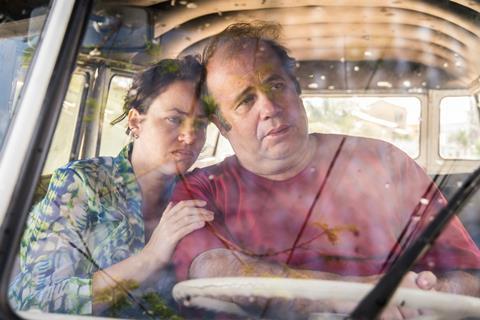Karine Teles leads as a mother struggling to let go of her teenage son in an uneven but chariming drama

Dir. Gustavo Pizzi. Brazil/Uruguay, 2017. 97 mins
South American cinema has led the way when it comes to depicting mature women on screen, with Brazil in particular fielding Oscar-worthy performances from Fernanda Montenegro in 1988’s Central Station up to last year’s Aquarius, starring Sonia Braga. Loveling (Bezinho), a debut from Gustavo Pizzi and starring his former wife and co-writer Karine Teles (The Second Mother), is cut from the same cloth; albeit a little more awkwardly than its antecedents. Its naked adoration of the central matriarch may lead this Sundance-bowing film into contrivance, but there’s no denying Loveling’s rambunctious charm.
DoP Pedro Faerstein shoots the wet mists and sodden colour-flash beauty of the outskirts of Rio de Janeiro State with glowing elegance
Opening the World Cinema Competition in Park City, this audience-pleaser is certainly destined for healthy festival exposure throughout 2018, and select theatrical play in Portugese-speaking markets. Loosely counting down the days until a loving mother loses her beloved 17 year-old son to a vague sporting contract in Germany, Loveling relies on the charm of its chaotic central family (an overweight son who insists on carrying a giant tuba around with him, for example) and the warmth of Teles to seduce and dazzle audiences into submission.
She plays Irene, mother of sporty Fernando (Konstantinos Sarris), the tuba-playing Rodrigo (Ivan Telas) and younger twin boys. She’s also the long-suffering wife of Klaus (Otavio Muller), currently running a copy shop but prone to dreaming and scheming, and sister to the battered Sonia (Adriana Esteves), currently living in her crumbling home.
As a metaphor, the falling-apart house is not entirely subtle. Also, it’s hard to work out how Irene, a former maid studying for her high school diploma, and Klaus have managed to assemble four kids and three homes (another is unfinished, while he wants to sell a seaside house they own). Apart from the copy shop, their only income is selling noodles and bed-linen seconds out of the back of a combi van.
Given to squabbling and talking over each other, the family is led by the cheerful Irene, who shops in second-hand clothes shops manned by an alarmingly hirsute gay hipster and can’t help but pathetically seek approval from her former employer - much to the anger of Klaus who believes she was little more than a slave. This seems real. As does Irene’s rising dread and obfuscation when faced with the imminent departure of Fernando. When she suddenly binge-eats from the fridge while dancing with her headphones on, however, or inexplicably goes into sudden overdrive trying to clear a house, Loveling indulges its own personal backstory. Certainly, Pizzi gives his former wife Teles the showcase she deserves, although it may be at the expense of credibility.
Amongst the younger actors, Sarris is surprisingly likable in the role of Fernando, given he shows scant athletic ability. And DoP Pedro Faerstein shoots the wet mists and sodden colour-flash beauty of the outskirts of Rio de Janeiro State with glowing elegance, accompanied by an jaunty, nervy score by Daniel Roland, Maximiliano Silveira and Pedro Sá, which keeps it all moving.
Production companies: Bubbles Project
International sales: New Europe Film Sales, jan@neweuropefilmsales.com
Producer: Tatiana Leite
Executive producers: Leo Ribeiro., Tatiana Leite, Rodrigo Leite
Screenplay: Karine Teles, Gustavo Pizzi
Cinematography: Pedro Faerstein
Editor: Livia Serpa
Main cast: Karine Teles, Otavio Muller, Adriana Esteves, Konstantinos Sarris, Cesar Troncoso, Ivan Telas, Vicente Demori















![[L-R]: Amanda Villavieja, Laia Casanovas, Yasmina Praderas](https://d1nslcd7m2225b.cloudfront.net/Pictures/274x183/6/4/1/1471641_pxl_20251224_103354743_618426_crop.jpg)








